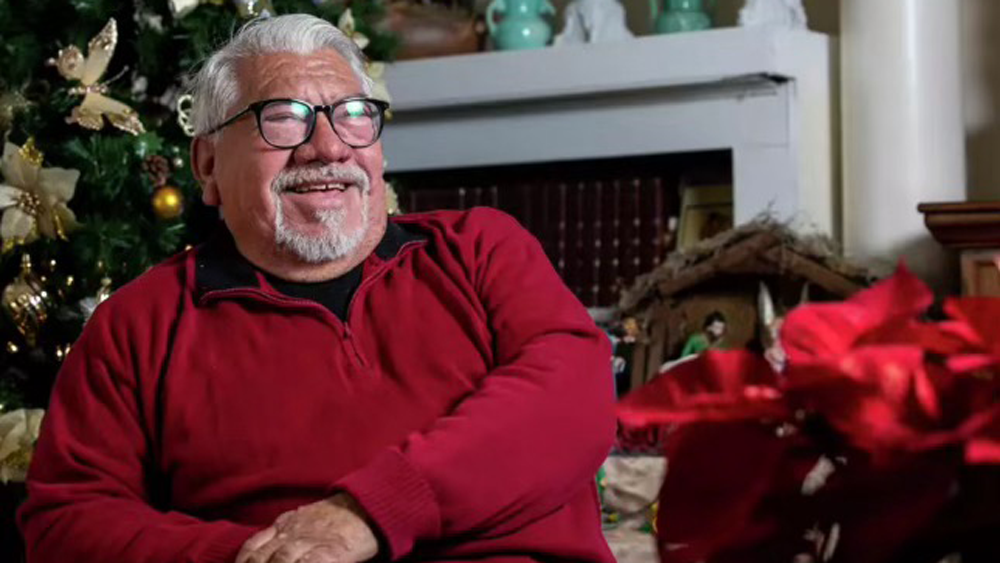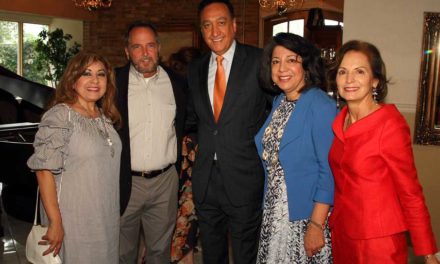My mother used a phrase in Spanish to describe people so likeable, so congenial and charming, that they were easy to love at first sight.
Se da a querer, she’d say.
The Mexican dicho serves to describe a host of San Antonians, self-assigned helpers and volunteers, heroes who come to the rescue without anyone knowing they did.
But on this Christmas morning, the phrase best serves to tell you about Bernie Cantú, a 69-year-old San Antonian who lives on the city’s West Side. People come knocking at his door for all sorts of reasons, but mostly to spend time with him.
Some friends call him St. Bernardino, his given name, for his devotion to the Catholic Church and his strong familial ties to it.
Others joke he’s a Guadalupano, a member of a society devoted to the brown-skinned Marian figure.
In spirit, he may be, but his devotion was largely to one Guadalupe, his late mother who was born on Our Lady of Guadalupe’s feast day and named for her.
Bernie is a man of faith.
He serves on the parish council of Christ the King Catholic Church and this year received the Archdiocese of San Antonio’s Lumen Gentium Award, given to a member of each parish who has demonstrated by his or her life and service a devotion to Jesus Christ and the church’s mission.
His birth
Bernie has outlived all expectations. He was born with spina bifida, a condition in which the spine and spinal cord don’t form properly.
“I was disabled at birth,” he says, describing a tumor on his spine that at 6 months of age was removed.
Bernie managed to walk with aluminum braces and crutches until third grade. As he grew and became heavier, however, the braces began to dig into his skin.
He graduated to wheels.
They’ve taken him everywhere — college, cruises to Alaska, Mexico City and elsewhere. In Colorado mountain snow, he skied in a canoe.
As a boy, he boarded public buses with his best friend Louis Escareño, who lived next door. They headed downtown to see what was happening and to the airport to watch takeoffs and landings.
They’ve remained friends. He’s one of the people Bernie credits, alongside his parents and family, with helping him throughout his life. He lives on that gratitude.
Up until now, Bernie has refused a motorized wheelchair, preferring to wheel himself, accounting for his upper-body strength.
An immigrant’s journey
Bernie is an immigrant. His father came to San Antonio from Monterrey first, initially as part of the federal bracero work program.
His mother and siblings arrived in the early 1960s, a year before he did. Bernie stayed behind with his grandmother.
Immigration authorities, worried about the spread of polio, held up the child’s paperwork.
His father meanwhile held down several jobs to support the family, working as a maintenance man for the Sisters of Charity of the Incarnate Word.
By night, he worked at a liquor store and the famed Lerma’s Nite Club.
Bernie, the oldest of six, says his parents always treated him like they did their other children, disciplining him when he got in trouble.
He got in his fair share of it.
But his parents were “softies,” he says.
“I don’t want to make them bigger than they were,” but says they most helped him become independent and adventurous.
“I thank them,” he says, for not coddling him for his disability and never holding him back from doing anything he set his mind to do.
That’s why, as a teen, Bernie learned to drive a car equipped with hand controls. He still drives. He’ll be 70 in April.
At 6, he started school in San Antonio not knowing a word in English. None of his teachers spoke Spanish. So his father wrote notes that helped Bernie communicate.
One said, “I need to go to the restroom.”
Bernie went to a school for disabled children from fourth to eighth grade. It failed him intellectually.
In ninth grade, he applied to Holy Cross High School, then a Catholic school exclusively for boys. The monthly $40 tuition bill was challenging.
But he thrived there.
During his junior and senior years, he worked for a federally funded youth jobs program in the school’s office. His earnings helped pay for tuition.
Bernie thanks the Brothers of the Holy Cross for many of his successes, but it was his classmates who elected him senior class president.
South Bend, Indiana
Under the tutelage of the Holy Cross brothers, Bernie applied to the University of Notre Dame in South Bend, Indiana, and won an academic scholarship along with other aid.
He arrived in a state he’d never visited and a campus he didn’t know.
In Yiddish, that’s chutzpah. Bernie still possesses lots of it.
For all its glory, Notre Dame didn’t offer the accommodations he needed. The Americans with Disabilities Act was years away from passage.
So, when Bernie needed to get in and out of buildings that presented stairs, no elevators nor ramps, he waited patiently outside for a fellow student who didn’t have to exert much effort to get him and his wheelchair inside.
That compounded his gratitude.
Eventually, the school constructed some ramps for him.
I know Bernie’s smile and demeanor, so I imagine que se dio a querer in South Bend.
His roommate, randomly assigned, was a source of constant help. They ended up rooming together all four years and remain friends. Though Bernie admits that lately he’s only spoken to his college friend through his wife.
He becomes serious when saying he plans to pick up the phone and call him soon.
The city’s first Amigo
Retired in 2011, Bernie worked for the Texas Attorney General’s Office’s division of child support and then the City of San Antonio in various departments.
He oversaw the first iteration of the city’s Amigos Ambassador Services, which helps tourists find their bearings downtown.
Bernie knows that part of the city well. He’s lived in the Casino Building for years, long before living downtown was cool.
He worked with the late, great Judy Babbitt, director of the city of San Antonio’s Disability Access Office, to make the city’s streets and sidewalks more accessible for those with disabilities.
When his beloved mother became ill, it was Bernie who quit working and moved into the family home to care for her. He was with her until her last day in 2014.
He still lives in that house, alone.
2023 was a challenging year, not that he complains.
He developed several life-threatening infections stemming from prolonged sitting and lying on his back.
The other day, he sounded joyful in saying that one of the most difficult to heal wounds was almost closed.
Friends and family members have wondered if it’s time for Bernie to move into an independent-living or skilled-nursing facility.
He isn’t having it, at least not yet.
Those who’ve known him the longest have never heard Bernie say anything close to “poor me.”
He doesn’t like asking for help.
Last week, he was wheeling himself around his kitchen and wrapping Christmas presents. He went to lunch with a couple of old friends.
He grudgingly agreed to this interview, then to being photographed. He just doesn’t think he’s altogether that special, that he’s done nothing extraordinary to merit attention.
But this is what everyone who knows him knows: That we’ve learned a lot from Bernie about the boundless possibilities of the human spirit, as one friend put it.
We’ve seen in him how a dogged determination to live can propel someone far beyond expectations.
And that a man, an amazing life force, has modeled a way of living in gratitude not just on this beautiful Christmas Day, but every day
Ayala: San Antonio’s ‘first amigo’ lives out loud and beyond expectations The man called ‘St. Bernardino,’ not entirely in jest










